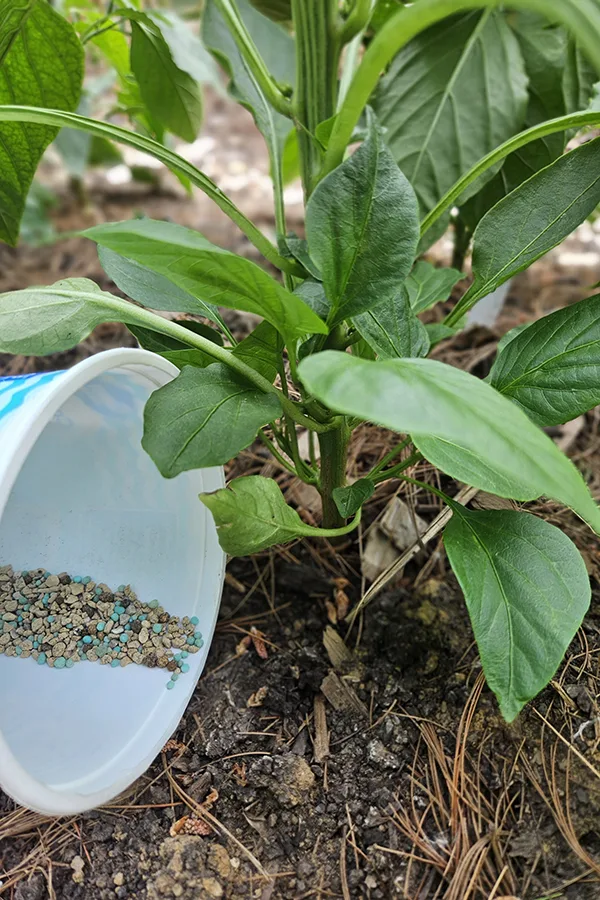Best Fertilizers for Peppers: Enhance Growth and Flavor with Our Top Picks
Best Fertilizers for Peppers: Enhance Growth and Flavor with Our Top Picks
Blog Article
Exactly How Plant Foods Play an Essential Function in Growing Healthy And Balanced and Abundant Pepper Crops
Fertilizers function as the backbone of successful pepper growing, providing a critical approach to nourishing the soil and fostering optimal plant development. The detailed dancing in between vital nutrients and the pepper plants' physical procedures emphasizes the pivotal role that fertilizers play in making sure a bountiful harvest. From fueling robust origin growth to bolstering disease resistance, the effect of plant foods is far-reaching in the cultivation of productive and healthy pepper crops. Stay tuned to reveal the nuanced methods which plant foods add to the growing of pepper plants and the sustainable methods that underpin their efficacy.
Relevance of Nutrient-Rich Plant Foods
The use of nutrient-rich plant foods plays a critical function in boosting the productivity and high quality of pepper plants in modern agricultural methods. Potassium, nitrogen, and phosphorus are primary nutrients that are essential for the development and growth of pepper plants.
Insufficient levels of these nutrients can result in stunted growth, decreased yields, and susceptibility to diseases (best fertilizers for peppers). Nutrient-rich fertilizers supply a targeted option to make sure that pepper plants obtain the necessary elements for optimal growth and efficiency. Furthermore, these plant foods aid improve soil fertility over time, producing a sustainable atmosphere for lasting pepper growing
Enhancing Plant Growth and Development
To enhance plant development and growth in pepper crops, tactical application of nutrient-rich plant foods is important. Fertilizers play a crucial role in enhancing the overall health and productivity of pepper plants by providing them with necessary nutrients that might be doing not have in the soil. Potassium, phosphorus, and nitrogen are key macronutrients called for in big amounts by peppers for durable development. Nitrogen help in leafed eco-friendly growth and overall plant vitality, phosphorus sustains origin growth and blossom development, while potassium adds to condition resistance and fruit high quality.
In enhancement to these macronutrients, trace elements such as iron, zinc, and magnesium are additionally vital for the correct performance of various plant procedures. Iron, for example, is needed for chlorophyll production, which is vital for photosynthesis and overall plant growth. Zinc plays an essential duty in enzyme task and hormone synthesis, impacting plant development and development at a mobile level. Magnesium is vital for the formation of chlorophyll and general energy transfer within the plant.

Boosting Disease Resistance With Plant Foods
By strategically integrating targeted fertilizers, farmers can boost the disease resistance of pepper crops, ensuring ideal plant health and performance. Plant foods consisting of important nutrients like nitrogen, phosphorus, and potassium play an essential duty in strengthening pepper plants' immune systems, making them extra durable to numerous conditions.

Taking Full Advantage Of Pepper Yield With Fertilizing
Utilizing a well balanced fertilizing method is crucial to achieving maximum pepper return and making sure optimum plant performance. By offering peppers with the best nutrients at the appropriate time, farmers can substantially boost their yield possibility. Potassium, nitrogen, and phosphorus are necessary aspects for pepper growth, with nitrogen assisting in leaf and stem growth, phosphorus sustaining root development and flower formation, and potassium advertising overall plant wellness.
To make the most of pepper yield, it is important to conduct dirt tests to identify existing nutrition degrees and identify any type of shortages that require to be addressed. Based upon these outcomes, farmers can develop a customized fertilizing strategy that meets the certain demands of their pepper plants. Additionally, appropriate fertilizing strategies such as split applications throughout the growing season can make certain continuous nutrition schedule for the plants.

Lasting Plant Food Practices for Peppers
In taking into consideration lasting fertilizer techniques for peppers, it is imperative to concentrate on long-term dirt health and environmental stewardship in combination with maximizing crop productivity. Sustainable fertilizer practices intend to boost or preserve soil fertility while decreasing unfavorable his comment is here ecological impacts. One vital approach is using organic plant foods such as compost, manure, or cover crops, which not just offer essential nutrients to the peppers yet likewise contribute to soil structure and microbial activity. These organic options help build organic matter in the soil, boosting its capacity to preserve water and nutrients, thereby supporting lasting plant health and resilience.
Additionally, precision agriculture strategies, such as dirt testing and targeted nutrient applications, can help optimize fertilizer usage, making sure that peppers get the nutrients they need without excess overflow into waterways. This not just profits the atmosphere by decreasing pollution but likewise conserves prices for farmers by lessening waste. By embracing sustainable plant food methods, pepper farmers can safeguard the wellness of their plants, soil, and bordering environments for future generations.
Conclusion
In verdict, plant foods are crucial for cultivating bountiful and healthy and balanced pepper plants. best fertilizers for peppers. They provide needed nutrients for plant development and development, increase condition resistance, and maximize yield. By applying sustainable plant food techniques, farmers can guarantee the long-lasting wellness of their pepper crops and add to Related Site a more environmentally-friendly and effective farming system
The intricate dance between necessary nutrients and the pepper plants' physical processes emphasizes the pivotal function that plant foods play in making certain a bountiful harvest.To optimize plant growth and advancement in pepper plants, strategic application of nutrient-rich fertilizers is vital. Plant foods play a crucial role in improving the general health and wellness and performance of pepper plants by providing them with important nutrients that may be doing not have in the dirt.By strategically incorporating targeted fertilizers, farmers can reinforce the condition resistance of pepper crops, guaranteeing optimal plant health and productivity. Fertilizers containing vital nutrients like potassium, phosphorus, and nitrogen play a crucial duty in reinforcing pepper plants' immune systems, making them a lot more durable to different diseases.
Report this page